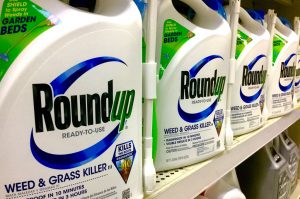22
Jun
Consumers Sue Monsanto for Misleading Labeling of Roundup Herbicide
(Beyond Pesticides, June 22, 2017) On Tuesday, a lawsuit was filed in a Wisconsin federal court against Monsanto, the manufacturer of Roundup brand herbicides, and Scotts Miracle-Gro Company, a marketer of Roundup brand products. The complaint, filed by six consumers from states around the country, focuses on the promotion, marketing, and sale of Roundup brand products, rather than physical injury from the pesticide products. The lawsuit alleges that the Monsanto and Scotts label, advertise, and promote their Roundup products with the “false statement that Roundup’s active ingredient, glyphosate, targets an enzyme that is not found ‘in people or pets.’” Plaintiffs assert that this is a false and deceptive claim, as this enzyme is found in the gut bacteria of people and pets and glyphosate can disrupt the health and functioning of their immune system.

This suit follows on the heels of and mirrors the lawsuit filed by Beyond Pesticides and Organic Consumers Association in April 2017 against Monsanto for misleading the public by labeling the weedkiller Roundup as “target[ing] an enzyme found in plants but not in people or pets.” Monsanto aggressively markets Roundup as safe for humans and animals, despite newer studies indicating that glyphosate may be carcinogenic and affect human and animal cardiovascular, endocrine, nervous, and reproductive systems. No reasonable consumer seeing these representations would expect that Roundup targets a bacterial enzyme that is found in humans and animals and that affects the health of their immune system. Consequently, plaintiffs in this case seek equitable relief on behalf of the general public, with all profits earned by Monsanto for sales of Roundup in D.C. to be deposited into a charitable fund for the raising of consumer awareness of the effects of glyphosate.
In the new lawsuit against Monsanto and Scotts, plaintiffs seek “compensation for themselves and Class Members equal to the amount of money they paid for Roundup Products that they would not have purchased had they known the truth, or in the alternative, the amount of money they paid based on the false statement.” The defendants use these false statements for marketing purposes, including video ads on their YouTube channels and websites and on their Roundup weedkiller labels.
Glyphosate is the active ingredient in Monsanto’s Roundup brand of weed-killers, and research by WHO’s International Agency for Research on Cancer (IARC) has found that it is a probable human carcinogen. Since IARC’s findings were released, Monsanto has made several efforts to discredit the research of this well respected, international body, including attempting to influence government agencies. Glyphosate is also patented as an antibiotic. Because glyphosate disrupts a crucial pathway for manufacturing aromatic amino acids in plants –but not animals— many have assumed that it does not harm humans. However, many bacteria do use the shikimate pathway, and 90% of the cells in a human body are bacteria. The destruction of beneficial microbiota in the human gut (and elsewhere in and on the human body) is, therefore, a cause for concern –and a major contributor to disease.
Beyond Pesticides has also filed several lawsuits against companies that have produced food products containing glyphosate, and then labeling those products “natural.” In August 2016, three non-profit organizations filed a lawsuit against General Mills for misleading the public by labeling their Nature Valley brand granola bars as natural. In November 2016, Beyond Pesticides and the Organic Consumers Association (OCA), represented by Richman Law Group, filed a lawsuit in Superior Court in the District of Columbia against Sioux Honey Association, for the deceptive and misleading labeling of its Sue Bee and Aunt Sue’s honey brands.
Consumers can also avoid glyphosate exposure but buying and supporting organic food and agriculture. Beyond Pesticides has long promoted the importance of organic in a sustainable food system, and works to promote the widespread transition of conventional farmland to organic production. By utilizing ecological pest management strategies, organic practices, and solutions that are not chemical-intensive are the most appropriate and long-term solution to managing unwanted plants, or weeds. To find out more about the work Beyond Pesticides is doing on organic integrity, check out Keeping Organic Strong, or to see all the reasons to go organic, visit Eating with a Conscience.
Sources: HuffPost
All unattributed positions and opinions in this piece are those of Beyond Pesticides.










